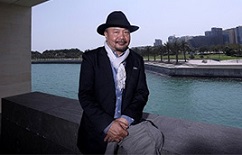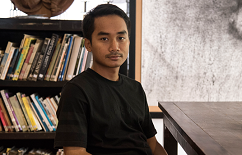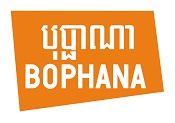2023
Short Documentary Lab with Rithy Panh 2022-2023

- Start date:
- Sep 04, 2022
- Ability Level:
- Intermediate to Advanced
Making a documentary is much more than simply filming what surrounds us. It can be a way of understanding the world, a tool to make it a better place, and an art form where you can find and express your own voice.
During this workshop, filmmakers will gain first-hand experience working alongside Oscar-nominated documentarian Rithy Panh. The world-renowned storyteller will teach participants his method of narration through working with memory, culture, and identity to gain an in-depth understanding of personal traditions, celebrations, community, and the oral history of a country. His teaching techniques build on the foundations of cultural memory to capture fragile moments through film. Participants will be encouraged to find their own narratives that explore the idea of identity and origins by truly living, working, and breathing with their subjects.
The first part of the lab will focus on development and pre-production, and participants will spend the first week meeting in person daily with lead mentor Rithy Panh. Participants will continue meeting online every week for the subsequent eight weeks, with weekly group and individual sessions.
The second part of the lab will resume after a two-month period of independent work, where participants develop and scout their projects on their own. In mid-January 2023, the weekly online meetings will resume with a more direct focus on pre-production, preparing for the final in-person documentary production intensive in May 2023. In the period between the final sessions, filmmakers will shoot independently and upload their footage for evaluation by the lab mentor.
The third and final part of the lab entails production, editing and post-production in person at our Doha Film Institute production villa. During this intensive period, participants are immersed in the process of documentary filmmaking under the close guidance of master filmmaker Rithy Panh. Participating filmmakers attend group sessions at the production villa 6 days per week, engaging in constant dialogue with Rithy, fellow lab participants and experienced professional mentors.
Application Deadline: 24 July 2022
Course Introduction by Rithy Panh
“The essential is always threatened by the insignificant”, wrote the poet René Char. In this new era of globalisation, his sentiment now seems to resonate with even more depth. The endless flow of information made possible by digital media brings with it countless benefits, but also contains many irrelevant distractions. Society is changing rapidly; views are changing, and economic development is accelerating. For centuries, since the drawings of the cave of Lescot, humanity has experienced art in two dimensions. Now mankind is entering the epoch of virtual reality, but what do we do with this new and powerful technology? How can we integrate this medium into our art without losing our roots and identity? It is on this reflection that the workshop will be built so that each participant not only discovers the relevant digital techniques, but also learns how to question their narrative in order to stay true to their content.
The secret to authentic documentary filmmaking lies in the approach of the filmmaker, in that they do not seek to make films about people, but with them. This means living with them, doing things with them, listening to them, giving them a voice. Only by working with the protagonists will their films bear true witness to the subject and the changing nature of today. The workshop will develop within participants this ability to look outward from the inside and pay close attention to language. Every culture has its own grace. We must capture these moments now, and perhaps later, when this kind of process has become ingrained, we can build the foundations of a cultural memory. This memory will be especially vivid and meaningful, as it is told by men and women – faithful witnesses of a time. Every community needs to know their roots to help them invent their future together, and this workshop will raise appreciation of the diversity of cultures within each community.
Schedule and Course Description
Application Deadline: 24 July 2022
Dates: September 2022 – June 2023
Fee: 2,800 QAR
Language: English
Group Size: Up to 10 participants
Programme Level: Intermediate/Advanced
Applicants should have made at least one short film and demonstrate experience with documentary filmmaking.
Important: Filmmakers admitted to the programme should commit to full participation in the lab sessions and all filmmaking assignments.
Part 1: Theory & Practice, Development & Pre-Production (10 weeks)
4 September – 5 November 2022
Week 1: In-person (4 – 10 September 2022)
The first 7 sessions will take place daily, from 5 to 8 PM at the DFI Production Villa.
Weeks 2-10: Online (11 September – 5 November 2022)
The online weekly group sessions will be 4 hours in duration (including breaks). The weekly one-on-one sessions are 60 minutes each. Timings will be determined based on the availability of accepted applicants.
- Theoretical discussion and tutorials
- Looking inside yourself: what do you want to talk about?
- Looking outside yourself: discovering reality
- Ethics in documentary filmmaking
- Overview of the creative process, from idea to the final product
- The relationship between you and reality during the process
- The relationship between your goal as a filmmaker and the expected final product
- Analysing and viewing films
- Development of participants’ documentary proposals
- Practical training
- How to scout for locations and subjects
- Fundamentals of filming and recording
- Shot lists and shooting plans
- Exercise
- Make a 3-to-5-minute film without editing (the subject will be assigned).
- Selection of projects to be produced in the second session
- Formation of production teams. Each participant will work in the team of at least one project as the director, producer, sound recordist, or camera person.
- Planning for the 2-month period of independent work
Part 2: Pre-production and Scouting (8 weeks)
14 January – 4 March 2023
Online: The online weekly group sessions will be 4 hours in duration (including breaks). The weekly one-on-one sessions are 60 minutes each. Timings will be determined based on the availability of accepted applicants.
- Developing relationships with documentary subjects
- Scouting locations and requesting filming permits
- Writing documentary treatment
- Developing a visual and narrative style
- Analyse and view documentary films as references
- Creating a production schedule
- Assembling a crew and team
Part 3: Filming, Editing, and Post-Production (6 weeks)
May – June 2023
Full commitment may be required during production and post-production, depending on the project. Participants must commit to attending the lab 6 days per week, at least from 5-8 PM.
- Shooting and analysis of the rushes with the assistance of an editor
- Editing and Post-production
By the end of the course, students will have created three to five documentary short films, which will be screened for the class. As a group, we will prepare distribution strategies. Then, based on their personal experience, each student proposes a new idea for another documentary. The lab ends by imagining new films and defining the individual style of each student.
How to Apply
Applicants should submit a proposal of no longer than one page for a short creative documentary film inspired by Rithy’s course introduction (maximum duration of 10 minutes). This proposal can be a simple idea or a theme; it must show the personal resonance and motivation of the student. Applicants should provide the reasons they want to make the proposed film and explain why they are the right person to tell the story they have chosen. Selected applicants are welcome to change their idea or develop a new idea during the lab. We understand that projects often evolve drastically during the development process.
Filmmakers are also welcome to apply with works-in-process. In this case, they should submit the documentary treatment, along with links to project material or sequences.
Please note that submission of materials does not guarantee admission. Applicants will be notified of their acceptance status in a timely manner after the submission deadline passes.
Submission Requirements
Please send the following together as one document (in Word or PDF format) to doclab@dohafilminstitute.com, including your full name, email, and contact number:
- A brief letter of intention explaining why you are applying to the lab (maximum one page)
- Short documentary film proposal/treatment (maximum one page)
If applying with a work-in-progress, submit the project treatment and a link to selected clips or sequences. - Previous work and/or artistic portfolio
- Short biography
This programme is open to citizens and residents of Qatar; applicants are requested to attach a copy of their Qatar ID to their submission.
Selection of Candidates
Candidates whose work shows promise will be shortlisted. Shortlisted candidates will be invited for an interview with the Institute and the lead lab mentor.
Class Participation
The importance of participation in this class cannot be overstated. Students should be prepared for every class and should always have their materials with them for presentation, discussion, and in-class workshops, and should be prepared to contribute ideas or ask questions in every session. They should demonstrate the self-discipline, commitment and respect toward others that is necessary for successful creative explorations and film production within a team. They should show initiative, take responsibility for their own work, and be able to solve problems when plans do not turn out as expected.
Meet the Mentors

Rithy Panh
Lead Mentor, Documentary Filmmaker
Rithy Panh is a filmmaker, writer and producer born in Phnom Penh, Cambodia. His work focuses primarily on the genocide committed by the Khmer Rouge régime in his homeland. He has directed numerous internationally acclaimed films, including ‘The Rice People’, which was selected for the Official Competition of the Festival de Cannes in 1994, and ‘The Missing Picture’, which was nominated for the Academy Award for Best Foreign Language Film and won the Grand Prix in the Un Certain Regard section at the Festival de Cannes. He then directed ‘France is our Mother Country’ (2014), ‘Exile’ (Cannes Film Festival 2016), ‘Graves Without a Name’ (Venice, Telluride, and Toronto Film Festivals 2018) and ‘Irradiated’ (official competition), which won the Documentary Award at Berlinale 2020. Rithy Panh recently won the Silver Bear for Outstanding Artistic Contribution for his stop-motion animation ‘Everything Will Be OK’ at Berlinale 2022. He is also a principal founder of the Cambodian Film Commission, an industry development organisation that includes the CFC Film Lab, a professional film training programme for Cambodians.

Socheat Cheng
Supporting Mentor
Socheat Cheng holds a bachelor’s degree in information technology. During his studies, he was always passionate about filmmaking. After his graduation, he got involved in numerous activities in the film industry such as documentary and fiction filmmaking, editing, colour grading, cinematography, camera assistant and visual effects. In addition, he participated in a year-long documentary film training program initiated by Bophana Audiovisual Resource Center. He also worked with many foreign film crews and production companies from France, Korea, and the USA. He recently became an assistant to Mr Rithy Panh and has helped make the films ‘The Missing Pictures’ (2013), ‘Exile’ (2016), ‘Bangskol: A Requiem for Cambodia’ (2017) and ‘Everything Will Be OK’ (2022).
| In collaboration with: Bophana Center, Cambodia.http://bophana.org/ | ||

|
||
SELECTED PARTICIPANTS 2022-2023
- Alessandra El Chanti (Lebanon)
- Ali Alhajri (Qatar)
- Dhoha Abdelsattar (Qatar)
- Eiman Mirghani (Sudan)
- Fatma Al-Ghanim (Qatar)
- Hadeer Omar (Egypt)
- Hamad Alfayhani (Qatar)
- Mariam Al-Dhubhani and Mohammed Al-Jaberi (Yemen)
- Mayar Hamdan and Shaima Al-Tamimi (Palestine / Yemen)
- Obada Jarbi (Palestine/Jordan)